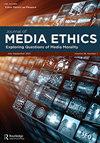Ethics of Authenticity: Social Media Influencers and the Production of Sponsored Content
IF 1.1
3区 哲学
Q3 COMMUNICATION
引用次数: 79
Abstract
ABSTRACT Media coverage of influencer marketing abounds with ethical questions about this emerging industry. Much of this coverage assumes influencers operate without an ethical framework and many social media personalities skirt around the edges of legal guidelines. Our study starts from the premise that influencer marketing is not inherently unethical but, rather, the ethical principles guiding production of sponsored content are not well understood. Through a case study of the travel and tourism media industry, our findings demonstrate that influencers use the concept of authenticity as an ethical framework when producing sponsored content. This ethics of authenticity is premised on two central tenets: being true to one’s self and brand and being true to one’s audience. This framework puts the influencers’ brand identity and relationship with their audience at the forefront while simultaneously allowing them to profit from content designed to benefit brands and destinations.真实性伦理:社交媒体影响者和赞助内容的生产
媒体对网红营销的报道充斥着关于这个新兴行业的伦理问题。这些报道大多假设网红在没有道德框架的情况下运作,许多社交媒体人物绕过了法律准则的边缘。我们的研究从一个前提开始,即网红营销本身并不是不道德的,而是指导赞助内容生产的道德原则没有得到很好的理解。通过对旅游和旅游媒体行业的案例研究,我们的研究结果表明,网红在制作赞助内容时使用真实性概念作为道德框架。这种真实性伦理基于两个核心原则:忠于自己和品牌,忠于自己的受众。这个框架将网红的品牌身份和与受众的关系置于最前沿,同时允许他们从有利于品牌和目的地的内容中获利。
本文章由计算机程序翻译,如有差异,请以英文原文为准。
求助全文
约1分钟内获得全文
求助全文

 求助内容:
求助内容: 应助结果提醒方式:
应助结果提醒方式:


